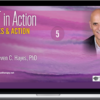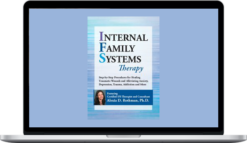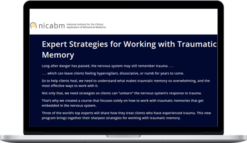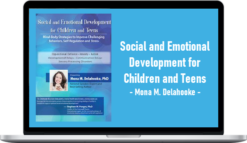Richard Schwartz – Healing Self: Going Beyond Acceptance To Self-Compassion
$69.99 $15.00
»Instant Delivery
Description
Richard Schwartz – Healing Self: Going Beyond Acceptance To Self-Compassion
Mindfulness has become a popular and useful tool in psychotherapy, but therapists too often encourage clients to adopt a passive-observer stance in therapy, as if it’s enough to just observe thoughts and emotions from a place of separation. This workshop will provide a comprehensive overview of how to guide your client move beyond detachment into a more engaged and relational form of self-compassion and self-healing.
What You’ll Learn In Healing Self: Going Beyond Acceptance To Self-Compassion
Objectives
- Integrate the IFS model into your clinical practice and accelerate healing for PTSD, anxiety, depression, substance abuse and eating disorders.
- Develop a deep understanding of how neuroscience informs therapeutic decisions in IFS therapy.
- Explore methods for honestly and transparently handling situations in which clients are emotionally triggered
Outline
Attachment Injuries
- Internalized Parts of the Self
- Parts Can Be Useful
- Extreme Beliefs and Emotions
- Injuries Like a Virus
Goal of Therapy
- Harmony and Integration
- Use the One Mind of Integration
Mindfulness Approaches Allow the Noticing and Awareness of What Happens in Emotional Pain
- Can be used to move away from pain without resolving it
- Parts Work Results in Healing Legacy Burdens
Map of the Parts Territory
- Vulnerable Parts that are hurt by Trauma
- Protectors
- Exiles: connect, witness, and retrieval: interact with adult part, and move to present time
- Managers
- Firefighters
- Bring Protectors into Realization That They do not Have to Change Now
- Can Ask How the Self Feels Toward Different Parts = Parts Detector
Parts Protect the System
- Recognizing These Parts
- Parts Triggered in Relationship
- Curiosity, Confidence, Compassion, Creativity, Courage, Calm
- Connectedness and Clarity
- Self Heals and Becomes the Absence of Parts with the Ability to Love Parts Under Stress
About Richard Schwartz
Richard Schwartz began his career as a family therapist and an academic at the University of Illinois at Chicago. There he discovered that family therapy alone did not achieve full symptom relief, and in asking patients why, he learned that they were plagued by what they called “parts.” These patients became his teachers as they described how their parts formed networks of inner relationship that resembled the families he had been working with.
He also found that as they focused on and, thereby, separated from their parts, they would shift into a state characterized by qualities like curiosity, calm, confidence and compassion. He called that inner essence the Self and was amazed to find it even in severely diagnosed and traumatized patients. From these explorations, the Internal Family Systems (IFS) model was born in the early 1980s.
IFS is now evidence-based and has become a widely-used form of psychotherapy, particularly with trauma. It provides a non-pathologizing, optimistic, and empowering perspective and a practical and effective set of techniques for working with individuals, couples, families, and more recently, corporations and classrooms.
In 2013, Schwartz left the Chicago area and now lives in Brookline, MA where he is on the faculty of the Department of Psychiatry at Harvard Medical School.
Speaker Disclosures:
Financial: Dr. Richard Schwartz is the Founder and President of the IFS Institute. He maintains a private practice and has an employment relationship with Harvard Medical School. He receives royalties as a published author. Dr. Schwartz receives a speaking honorarium, recording, and book royalties from Psychotherapy Networker and PESI, Inc. He has no relevant financial relationships with ineligible organizations.
Non-financial: Dr. Richard Schwartz is a fellow of Meadows Behavioral Healthcare and is a member of the American Family Therapy Academy and the American Association for Marital and Family Therapy. He is a contributing editor for Family Therapy Networker. Dr. Schwartz serves on the editorial boards for the Journal of Feminist Family Therapy, the Contemporary Family Therapy, the Journal of Family Psychotherapy, and the Family Therapy Collections.
More courses from the same author: Richard Schwartz
Delivery Policy
When will I receive my course?
You will receive a link to download your course immediately or within 1 to 21 days. It depends on the product you buy, so please read the short description of the product carefully before making a purchase.
How is my course delivered?
We share courses through Google Drive, so once your order is complete, you'll receive an invitation to view the course in your email.
To avoid any delay in delivery, please provide a Google mail and enter your email address correctly in the Checkout Page.
In case you submit a wrong email address, please contact us to resend the course to the correct email.
How do I check status of my order?
Please log in to HealingCourse account then go to Order Page. You will find all your orders includes number, date, status and total price.
If the status is Processing: Your course is being uploaded. Please be patient and wait for us to complete your order. If your order has multiple courses and one of them has not been updated with the download link, the status of the order is also Processing.
If the status is Completed: Your course is ready for immediate download. Click "VIEW" to view details and download the course.
Where can I find my course?
Once your order is complete, a link to download the course will automatically be sent to your email.
You can also get the download link by logging into your HealingCourse account then going to Downloads Page.
Related products
Total sold: 1








